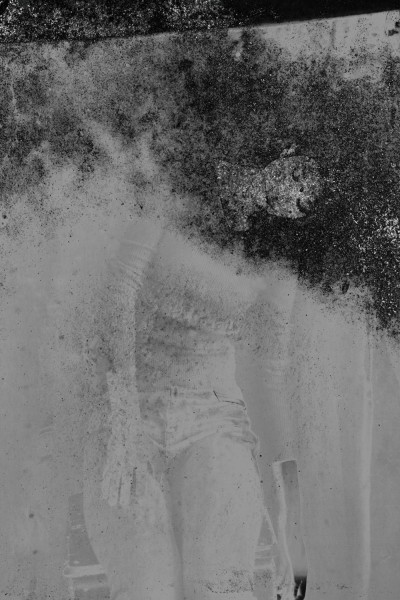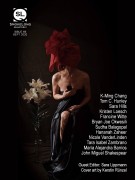I am on the southbound bus from Taipei, headed for my grandmother’s village. She lived as deep as anyone can on an island without coming out the other side. I should say lives, maybe, because she is haunting me. She drops by on Tuesday evenings and gives me her trademark smile, the one that swallows her whole face. She likes to tell me how much she enjoyed my daughter’s elegy, about whether Ah-Zou, the Taiwanese word for great-grandmother, might be made-up because it can’t be found in the dictionary between azalea and azure. My grandmother chuckles, says she doesn’t even know the Taiwanese word for great-grandfather. There was never any need for one. Men don’t live long enough.
Yes, but at least they actually die, is what I always say.
My aunt picks me up at the bus-stop. She laughs so hard when I tell her I’m being haunted that she froths at the mouth. I don’t mention what my grandmother said last time she visited, that she plans to reincarnate into my unborn baby. I don’t mind. This pregnancy was a surprise, a slip. My husband stormed off on the night I gave him the news, but I didn’t mind that either. I like the sound of tires pulling fast out of a driveway, of something tearing. My aunt asks if it was wise to travel internationally, in my condition. Haunted, do you mean? I say. She laughs more, but somehow less. She chatters now: She loved my daughter’s elegy. She wishes there were such a thing as a Taiwanese dictionary. Taiwanese is an unwritten language.
I tell her that my husband is a contract attorney and only believes in things that are written down.
My aunt takes me to my grandmother’s house, which is filled with relatives waiting to greet me, thicker than the summer fireflies. They are all people-of-people: My cousin’s husband’s sister; my uncle’s stepbrother’s grandchild. I am not me either. In a village like this no one goes by names, only graves do. That may be why my grandmother doesn’t know to stay in hers. I say that I plan to call the baby Tomiko, after my grandmother, who was born during the Japanese occupation. My uncle jokes that Tomiko ends with ko, and kou in Mandarin means mouth. Opening. The character looks like an empty box. Do I want an empty baby?
But my baby is going to be too full. My baby is going to be two people.
I pass around an ultrasound picture in which the baby looks translucent and floaty, much like my grandmother’s ghost. They coo over the snail-shell shape of her. Back home, my mother’s reaction was to click her tongue and say another girl? Are you sure? She said it in Mandarin so that my husband wouldn’t understand, but my husband wasn’t there anyway. My mother likes to brag that she wouldn’t recognize him on the street, because that’s how busy he is! How important! How ambitious! Sometimes when I wake up to an empty bed I wonder if he died too and I’ve just forgotten. My aunt says she likes solid American names, like Janet and Michelle.
The baby will not answer to Michelle, I say. Michelle will glide off her like bath oil.
My aunt and I sit in my grandmother’s garden and the hours roll by. I don’t know how long it’s been, if it’s already too late. I remember once telling my daughter that her Ah-Zou would live on in all of us. I didn’t think that Ah-Zou would be living on in only one of us. My aunt says that my husband was generous to let me come to Taiwan alone. I give her a smile that is the opposite of my grandmother’s. When I asked my husband if I could take this trip, I didn’t say I had to appease a ghost, because he doesn’t believe in ghosts; ghosts are also unwritten. He fussed worse than any baby, insisting that he had projects, deadlines, accounts, commitments, plans, and what did I have? He’s a contract attorney, for goodness’ sake, and what am I?
Kou. That empty box.
On Tuesday evening the rain falls hard enough to flood, and my grandmother doesn’t come. My aunt says that her mother never liked when water swept through like wind, or how the sea snakes would swim right in, slink between the table legs. The idea of sea snakes makes Taiwan seem faraway and almost mythical. Maybe I never lived here at all. I wonder if I have lived anywhere. My aunt offers to fetch my grandmother’s old diary so we can read her words and recreate her presence that way. I comment that my grandmother talks more in death than I ever remember her doing in life. She liked to hover silently by the stove, didn’t she? There always seemed to be something simmering, never coming to a boil.
That something was her, says my aunt.
I listen to my aunt read aloud. So disappointed – another girl, on the day my mother is born. I was going to have a boy, once. We found out because they ran a bunch of tests on it, while I was pregnant. My brand-new husband insisted. He wanted to be sure it was healthy, or he wanted to be sure it was his. One of the tests was too intrusive. Like my mother. You can’t be pregnant out of wedlock, she’d said. She feared losing face. I imagined face sliding off her, soiling her slippers. I’ve never told her my husband killed our baby, that that’s why he stays. My aunt is now rifling through the diary like that can’t be all there is. I say that maybe my grandmother visits me because she can tell I’m not real either. I think I used to be, though. My aunt laughs. She leans over and pinches me and I manage to feel it.



 A SmokeLong Summer 24!
A SmokeLong Summer 24!